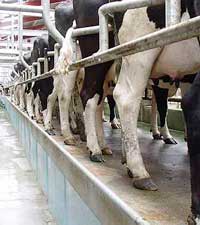Dairy farmers told to ‘transform negotiation tactics’

Farmers must transform their negotiation tactics with milk buyers if they are to have any chance of combating one-sided contracts and increasing prices.
They need better training to arm themselves with the skills to counter the expert negotiators they are pitted against, so delegates heard at a NFU/NFUS-instigated summit.
The event, at Chesford Grange, Warwickshire, was part of the NFU’s campaign encouraging farmer milk selling groups and co-ops to “toughen up” their contractual relationship with milk buyers and to try and make contracts more fair and equitable.
“Negotiators need to be well-trained, have a good strategy, be well prepared, professional and honest. The benefits of negotiation training cannot be overstated. If you haven’t trained, don’t start negotiating,” said John Hoyles, past chairman of the NFU sugar board.
Farmers were also encouraged to engage independent, third-party mediators if negotiations come to a standstill.
Graham Massie, a director of the Centre for Effective Dispute Resolution, said that mediation was a sensible alternative to litigation – and one which could save time, money, risk and dignity.
“It is a flexible process with no firm rules as every situation is different. Both parties remain in ultimate control of the decision to settle the terms of the dispute, but the neutral party assists them in reaching a negotiated agreement.”
NFU chief legal adviser Nina Winter said: “I have never seen a contract before where a buyer could retrospectively change the price; have never seen a contract with no formulae to derive the price; have never seen a contract where the supplier has to continue to supply even if the buyer’s price changes; and have never seen one where the buyer has to take everything a supplier produces and the supplier can only sell to one buyer.”
Most farmers also did not understand their contracts and what they were signing up to, she added. “The contract is the fundamental basis on which farmers and processors do business, and yet most farmers do not understand their contract and know what their rights are, or what their dairy company can or cannot do.”
If she was a commercial lawyer and she was presented with most dairy contracts, she would simply “rip them up”, she said.
